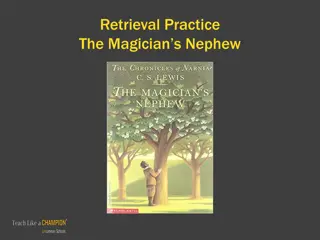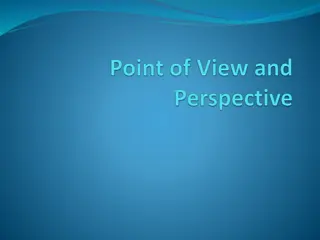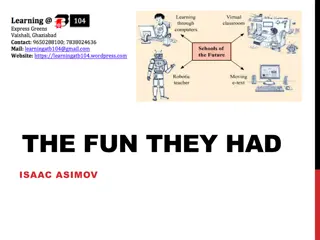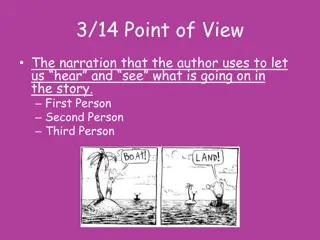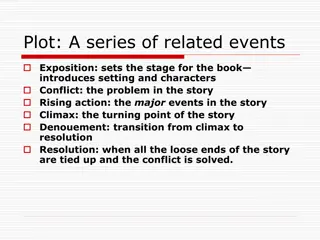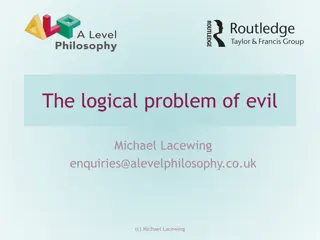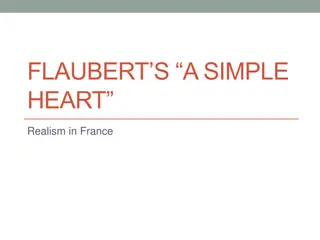Analysis of Fantasy Elements in "The Magician's Nephew" & Victorian Gender Roles
Explore the fantasy genre in "The Magician's Nephew" with a focus on elements like intrusive narration, allusions, and suspense. Delve into how C.S. Lewis's life influenced the novel. Discover Victorian gender roles through concepts like separate spheres and class distinctions. Unveil literary terms
0 views • 13 slides
Understanding Point of View in Literature
Explore the different perspectives used in storytelling, such as first person, third person omniscient, limited, and objective. Discover how each viewpoint shapes the reader's understanding of characters and events in a narrative. Learn to identify and analyze the various points of view to enhance y
1 views • 16 slides
The Role of the Narrator in Blood Brothers
The concept of the narrator in storytelling can be traced back to the Greek chorus in ancient Greek theater. In Blood Brothers, the narrator plays a significant role in guiding the audience through the story, providing commentary, and influencing the narrative's progression. Understanding the differ
0 views • 8 slides
The Fun They Had by Isaac Asimov - Story Analysis
In "The Fun They Had" by Isaac Asimov, set in the future, 11-year-old Margie dislikes the mechanical school system. She learns about traditional schools from the past and longs for the communal learning experience. The narrative point of view is third person limited omniscient, focusing on Margie's
0 views • 15 slides
Understanding Point of View in Narration
Point of view (POV) in storytelling plays a crucial role in how readers perceive and engage with a story. This content explains the three main types of POV - First Person, Second Person (rarely used), and Third Person (including Omniscient, Limited, and Objective). Each POV brings a unique perspecti
0 views • 10 slides
Analysis of "The Suit" by Can Themba
In "The Suit" by Can Themba, Philemon discovers his wife's infidelity and punishes her by making her treat the lover's suit as a guest in their home. The story unfolds in Sophiatown, South Africa, showcasing themes of infidelity and forgiveness, leading to a tragic outcome. Through a third-person om
0 views • 16 slides
Analysis of Narrative Techniques and Character Development in Pride and Prejudice
Jane Austen's novel, Pride and Prejudice, employs a third-person omniscient narrator to provide insights into character perspectives, particularly focusing on Elizabeth Bennet. The narrative techniques reveal different viewpoints and character depths, while the character analysis of Mr. Bennet showc
0 views • 10 slides
Analyzing "The Landlady" by Roald Dahl
The analysis of "The Landlady" by Roald Dahl delves into key elements such as plot, setting, point of view, characters, theme, and genre. The story portrays how appearances can be deceiving as a seemingly harmless landlady turns out to be a sinister character. Through a third-person limited omniscie
0 views • 10 slides
Elements of Storytelling: Plot, Conflict, Point of View
Explore the key components of storytelling such as plot development, conflict types (external and internal), and various perspectives (first, second, third person omniscient). Understand how these elements shape the narrative, create suspense, and engage readers in different ways.
0 views • 14 slides
Exploring the Logical Problem of Evil and Theodicies
The logical problem of evil questions the existence of a supremely good, omnipotent, omniscient God in the face of evil. Two types of evil, moral and natural, are considered. Responses include the free will theodicy and objections regarding choice and free will. Theodicy versus defense is explored a
0 views • 12 slides
Realism in France: Exploring Flaubert's A Simple Heart & Literary Aims
Realism in France was marked by capturing truth without sentiment, covering new subjects like democracy and industrial revolution, and showcasing the ugly alongside beauty. Gustave Flaubert's work, "A Simple Heart," exemplifies these characteristics, reflecting the ordinary social world with ethical
0 views • 18 slides
The Logical Problem of Evil in Religious Belief
The logical problem of evil questions how a God who is omnipotent, omniscient, and omnibenevolent could allow evil and suffering to exist in the world. Epicurus' formulation challenges the traditional views on God's attributes and raises questions about why such suffering exists despite the belief i
0 views • 24 slides
